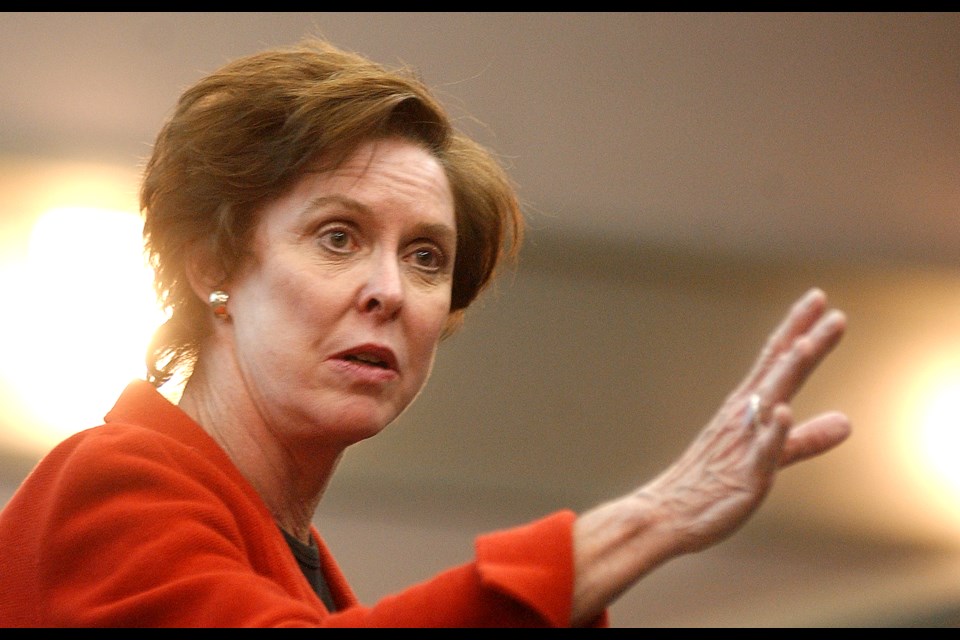From around the corner or across the globe, Barrie resident and former politician Aileen Carroll has made a positive difference.
She has served the public at all three levels of government, initially as a Barrie city councillor from 1995 to 1997 and then as a Liberal Member of Parliament in the House of Commons for three terms from 1997 to 2006, representing the riding of Barrie-Simcoe-Bradford (later the realigned riding of Barrie), where she served as the Minister for International Co-operation.
She remains Barrie’s first, and only, federal cabinet minister.
That was followed up by service at Queen’s Park as a Liberal Member of Provincial Parliament.
Before ever having her name ticked off at a ballot box, politics was always in her blood, according to husband Kevin Carroll, a well-known lawyer, Canadian Forces veteran, and past-president of the Canadian and Ontario bar associations.
The couple married in 1968.
At the ripe old age of 21, she moved from her Halifax home to Ottawa where she worked in what was then called the external aid office, now called Foreign Affairs, Trade and Development Canada.
“She was one of the administrators of the Columbo Plan, which was an aid program sponsored by the Canadian government, largely for Asian and south-east Asian students,” Kevin tells BarrieToday. “She worked there as a junior executive officer and after a couple of years went back to graduate school as a political-science major.”
So, she was involved with government long before she was in politics.
“Absolutely,” Kevin says from the couple’s east-end home, where they have lived since 1983 after moving there from another east-Barrie residence.
“The irony here is that she came back to be the minister of what eventually became the department she started in,” he says with a chuckle.
Being a student of politics at university, both at the graduate and under-graduate level, spawned her interest in politics.
Between 1973 and 1995, she was a familiar face to city councillors of the era and had a good relationship with them, sometimes offering up input into their platforms.
But her own political career began at Barrie city council, where she served under mayor Janice Laking from 1995 to 1997.
“I have the highest regard for Janice,” says Carroll, who has recently been dealing with some health concerns. “The issues that most affected me at the time were affordable housing and no casino in downtown Barrie. That would have adversely affected the downtown. The folks that would (potentially) go to a casino wouldn’t go there and shop with downtown merchants.”
Carroll’s love for the community saw her working on projects close to her heart.
“Barrie is a most generous community when it comes to supporting community projects such as the downtown library, a committee that I chaired,” she says. “We raised more than $1 million for that.”
She also helped spearhead fundraising efforts for Royal Victoria Regional Health Centre (RVH) and Hospice Simcoe, and was a big supporter of the Barrie Out of the Cold, Habitat for Humanity, Barrie United Way, and Barrie Big Sisters programs.
“This community is so highly responsive to its needs,” she says with a quick smile that residents would still recognize.
Municipal government is an important part of people's lives, Carroll says.
“Citizen participation at the local or municipal level is evidenced by their ability to attend city council meetings during the public forum and make their own views known,” she says. “But the municipal level of government is not the level of government that affects the taxpayers most directly; that is the provincial government.
“The policy emanating from the provincial government through the Ministry of Municipal Affairs and Housing generally dictates that policy, which the municipalities more or less have to abide by.”
Many folks who have also had a chair in the council chambers in recent years have moved on to provincial or federal political lives, including Joe Tascona, Patrick Brown, Rod Jackson, John Brassard, Alex Nuttall and, most recently, Doug Shipley.
“City council is a great training ground in which to learn legislative analysis and responsibility to the voter,” Carroll says. “It is a forum where you can be known for your ideas and demonstrate your skill as a communicator.”
Voting is a “civic responsibility” for people to express their right to criticize a government’s conduct and policy, she says, acknowledging that participating in the voting process at all three levels of government has dwindled over the years.
“It’s largely due to lack of interest in public affairs generally and (voters’) motivation," Carroll says. "(People are thinking) governments will do what they want to do, that they don’t have much to say about it. That’s the apathy thing.
“But in the last federal election, that trend does not appear to be true. More people voted in the advance poll, the largest turnout in advance polling in recent history.”
Meanwhile, this city has changed for the better over the years, Carroll says.
“Barrie has grown up. It is a more sophisticated and multi-cultural community than it was when I arrived here in 1973,” she says. “Whether Barrie continues to grow in the future depends on (Ontario Premier) Doug Ford’s policies over the next few years. The province is a major force in directing policy that affects municipalities.”
Carroll says she's proud of her time as a public servant.
“Many of the people I have spoken with over the years were enthusiastic about speaking about government policy. I always accepted calls at my home or the constituency office. If a citizen had a point of view that needed to be discussed personally, I made myself available,” she says.
“My time in public life was extremely rewarding.”



